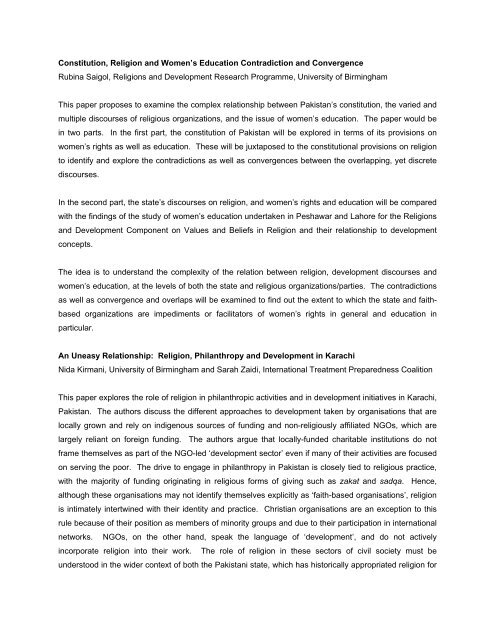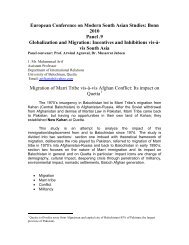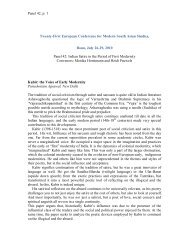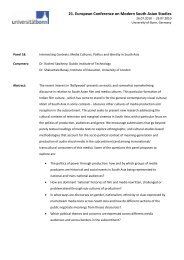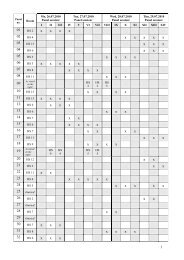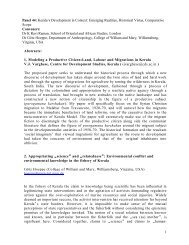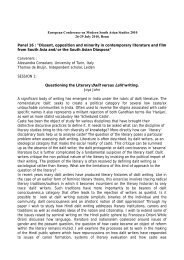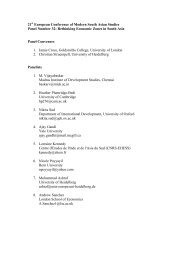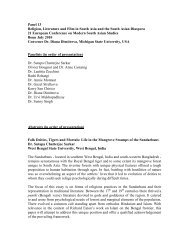Papers to be included in Panel 7: Rethinking the Role of Religion in ...
Papers to be included in Panel 7: Rethinking the Role of Religion in ...
Papers to be included in Panel 7: Rethinking the Role of Religion in ...
Create successful ePaper yourself
Turn your PDF publications into a flip-book with our unique Google optimized e-Paper software.
Constitution, <strong>Religion</strong> and Women’s Education Contradiction and Convergence<br />
Rub<strong>in</strong>a Saigol, <strong>Religion</strong>s and Development Research Programme, University <strong>of</strong> Birm<strong>in</strong>gham<br />
This paper proposes <strong>to</strong> exam<strong>in</strong>e <strong>the</strong> complex relationship <strong>be</strong>tween Pakistan’s constitution, <strong>the</strong> varied and<br />
multiple discourses <strong>of</strong> religious organizations, and <strong>the</strong> issue <strong>of</strong> women’s education. The paper would <strong>be</strong><br />
<strong>in</strong> two parts. In <strong>the</strong> first part, <strong>the</strong> constitution <strong>of</strong> Pakistan will <strong>be</strong> explored <strong>in</strong> terms <strong>of</strong> its provisions on<br />
women’s rights as well as education. These will <strong>be</strong> juxtaposed <strong>to</strong> <strong>the</strong> constitutional provisions on religion<br />
<strong>to</strong> identify and explore <strong>the</strong> contradictions as well as convergences <strong>be</strong>tween <strong>the</strong> overlapp<strong>in</strong>g, yet discrete<br />
discourses.<br />
In <strong>the</strong> second part, <strong>the</strong> state’s discourses on religion, and women’s rights and education will <strong>be</strong> compared<br />
with <strong>the</strong> f<strong>in</strong>d<strong>in</strong>gs <strong>of</strong> <strong>the</strong> study <strong>of</strong> women’s education undertaken <strong>in</strong> Peshawar and Lahore for <strong>the</strong> <strong>Religion</strong>s<br />
and Development Component on Values and Beliefs <strong>in</strong> <strong>Religion</strong> and <strong>the</strong>ir relationship <strong>to</strong> development<br />
concepts.<br />
The idea is <strong>to</strong> understand <strong>the</strong> complexity <strong>of</strong> <strong>the</strong> relation <strong>be</strong>tween religion, development discourses and<br />
women’s education, at <strong>the</strong> levels <strong>of</strong> both <strong>the</strong> state and religious organizations/parties. The contradictions<br />
as well as convergence and overlaps will <strong>be</strong> exam<strong>in</strong>ed <strong>to</strong> f<strong>in</strong>d out <strong>the</strong> extent <strong>to</strong> which <strong>the</strong> state and faithbased<br />
organizations are impediments or facilita<strong>to</strong>rs <strong>of</strong> women’s rights <strong>in</strong> general and education <strong>in</strong><br />
particular.<br />
An Uneasy Relationship: <strong>Religion</strong>, Philanthropy and Development <strong>in</strong> Karachi<br />
Nida Kirmani, University <strong>of</strong> Birm<strong>in</strong>gham and Sarah Zaidi, International Treatment Preparedness Coalition<br />
This paper explores <strong>the</strong> role <strong>of</strong> religion <strong>in</strong> philanthropic activities and <strong>in</strong> development <strong>in</strong>itiatives <strong>in</strong> Karachi,<br />
Pakistan. The authors discuss <strong>the</strong> different approaches <strong>to</strong> development taken by organisations that are<br />
locally grown and rely on <strong>in</strong>digenous sources <strong>of</strong> fund<strong>in</strong>g and non-religiously affiliated NGOs, which are<br />
largely reliant on foreign fund<strong>in</strong>g. The authors argue that locally-funded charitable <strong>in</strong>stitutions do not<br />
frame <strong>the</strong>mselves as part <strong>of</strong> <strong>the</strong> NGO-led ‘development sec<strong>to</strong>r’ even if many <strong>of</strong> <strong>the</strong>ir activities are focused<br />
on serv<strong>in</strong>g <strong>the</strong> poor. The drive <strong>to</strong> engage <strong>in</strong> philanthropy <strong>in</strong> Pakistan is closely tied <strong>to</strong> religious practice,<br />
with <strong>the</strong> majority <strong>of</strong> fund<strong>in</strong>g orig<strong>in</strong>at<strong>in</strong>g <strong>in</strong> religious forms <strong>of</strong> giv<strong>in</strong>g such as zakat and sadqa. Hence,<br />
although <strong>the</strong>se organisations may not identify <strong>the</strong>mselves explicitly as ‘faith-based organisations’, religion<br />
is <strong>in</strong>timately <strong>in</strong>tertw<strong>in</strong>ed with <strong>the</strong>ir identity and practice. Christian organisations are an exception <strong>to</strong> this<br />
rule <strong>be</strong>cause <strong>of</strong> <strong>the</strong>ir position as mem<strong>be</strong>rs <strong>of</strong> m<strong>in</strong>ority groups and due <strong>to</strong> <strong>the</strong>ir participation <strong>in</strong> <strong>in</strong>ternational<br />
networks. NGOs, on <strong>the</strong> o<strong>the</strong>r hand, speak <strong>the</strong> language <strong>of</strong> ‘development’, and do not actively<br />
<strong>in</strong>corporate religion <strong>in</strong><strong>to</strong> <strong>the</strong>ir work. The role <strong>of</strong> religion <strong>in</strong> <strong>the</strong>se sec<strong>to</strong>rs <strong>of</strong> civil society must <strong>be</strong><br />
unders<strong>to</strong>od <strong>in</strong> <strong>the</strong> wider context <strong>of</strong> both <strong>the</strong> Pakistani state, which has his<strong>to</strong>rically appropriated religion for


